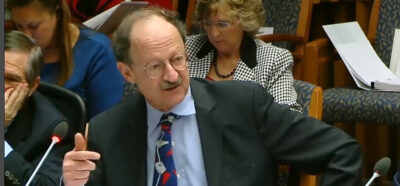Even at high cost, blood cancer drugs provide a good value, an analysis by Tufts Medical Center researchers found.
NCI will implement President Barack Obama's directive to ramp up the initiative in precision medicine, even if Congress doesn't appropriate specific funds for this purpose, Institute Director Harold Varmus told members of the National Cancer Advisory Board Feb. 12.
A year after it announced its decision to stop tobacco sales, CVS Health released data that shows how its stores are working to deliver the anti-smoking message.
New data projects that an $18 billion increase in funding per year by the international community could result in a 30 percent reduction in cancer deaths in low- and middle-income countries by 2030.
FDA Commissioner Margaret Hamburg announced that she will be stepping down at the end of March 2015.
NIH would receive a $1 billion funding boost in President Barack Obama's $4 trillion 2016 budget—a 3 percent increase—should Congress pass his proposal.
Computed tomography screening has become a benefit for Americans covered by Medicare. The Centers for Medicare and Medicaid Services Feb. 5 published a final decision to cover screening of current and former smokers, provided they meet stringent eligibility criteria. Beneficiaries will go through counseling, health professionals will be required to provide documentation that “shared decision-making”... […]
Introduction of biosimilar biologics will not bring about the same price drops as introduction of generic small-molecule drugs, said Rena Conti, an economist at the University of Chicago, whose work focuses on drug pricing.
In the next few weeks, FDA will announce its decision on Novartis's Zarxio, a granulocyte-colony stimulating factor biosimilar to Amgen's Neupogen.
President Barack Obama and several members of Congress announced a slew of initiatives this week aimed at eliminating the effects of sequestration for the government, and for medical research by providing increases for NIH and other federal agencies.







